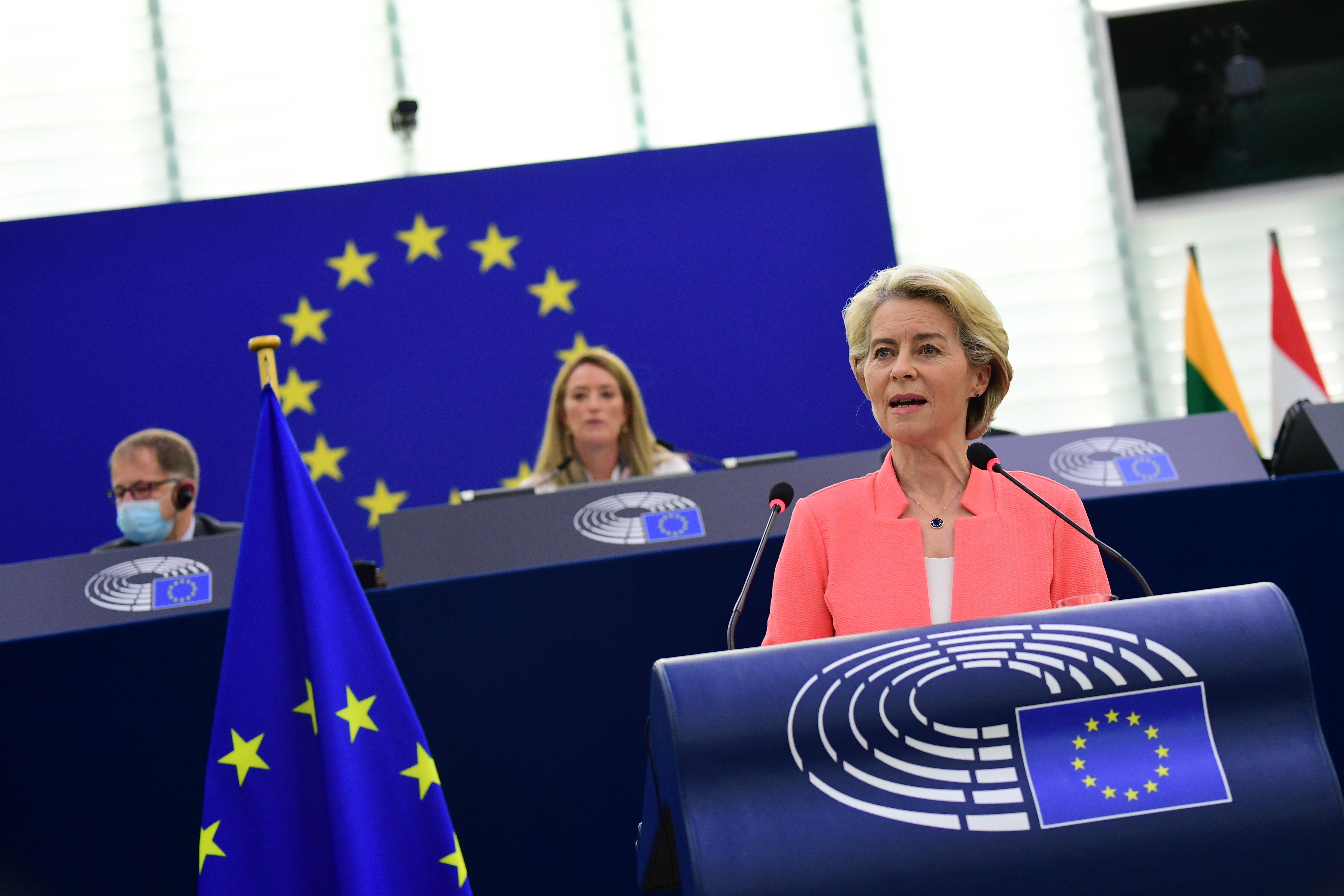EU commission chief warns against ‘pandemic of the unvaccinated’
In her second state of the union speech, Ursula von der Leyen pledges to donate €4bn to help poorer countries tackle the climate crisis

Your support helps us to tell the story
From reproductive rights to climate change to Big Tech, The Independent is on the ground when the story is developing. Whether it's investigating the financials of Elon Musk's pro-Trump PAC or producing our latest documentary, 'The A Word', which shines a light on the American women fighting for reproductive rights, we know how important it is to parse out the facts from the messaging.
At such a critical moment in US history, we need reporters on the ground. Your donation allows us to keep sending journalists to speak to both sides of the story.
The Independent is trusted by Americans across the entire political spectrum. And unlike many other quality news outlets, we choose not to lock Americans out of our reporting and analysis with paywalls. We believe quality journalism should be available to everyone, paid for by those who can afford it.
Your support makes all the difference.The European Commission president Ursula von der Leyen warned on Wednesday against a “pandemic of the unvaccinated” in a speech that also focused on urging other countries to step up the fight against climate change.
In her second “state of the union” address as European Commission president, Ms Von der Leyen highlighted issues that could potentially rock the EU and called for more independence for the block in tech and defence policies.
The past two years tested the EU’s resilience against the Covid-19 pandemic, the relative disparity in the economic recovery between its members, Brexit, and restraints over the rule of law among some of its eastern members.
Wednesday’s speech showed that the EU leaders are also worried about the challenges facing the EU’s fast-paced vaccination rollout after a stumbling kickoff earlier this year.
By the end of August, 70 per cent of the EU’s adult population had been fully vaccinated against Covid-19, an achievement that has also revealed big differences among EU countries.
Ms Von der Leyen voiced concerns over the varying vaccination rates in the EU and pledged another donation of 200 million doses of the coronavirus vaccine by the middle of next year, on top of a previous promise to donate 250 million doses.
“Let’s do everything possible (so) that this does not turn into a pandemic of the unvaccinated,” she told EU lawmakers in Strasbourg, France.
Nineteen EU economies will regain their pre-pandemic size this year, with the others following next year, she said.
Ms Von der Leyen’s speech also focused on tackling the climate crisis, vowing to allocate €4bn until 2027 to bolster poorer countries’ climate strategies and help them adapt to its impact.
The EU commission chief called on the US to adopt a similar strategy and increase support for third world countries.
“But we expect the United States and our partners to step up too. This is vital because closing the climate finance gap together, the US and the European Union would be such a strong signal for global climate leadership,” she said.
World leaders will face the challenge of climate finance at the Cop26 summit scheduled to start in November. In particular, many Western leaders are expected to put forward financial commitments to cut emissions faster and stave off catastrophic climate phenomena.
Meanwhile, in the wake of the chaotic troop withdrawal from Afghanistan in August, Ms Von der Leyen tried to push forward on an indepedendent EU defence strategy. Under her presidency, the block has failed to build unity among member states around a comprehensive and autonomous defence strategy, partly because of fierce opposition by influential member states.
But the catastrophic collapse of the Afghan army and the Taliban’s swift military victory in Afghanistan raised the alarm about the EU’s political will and its capacity to intervene militarily without relying on the US’s military might.
“The more fundamental issue is, why has this not worked in the past,” she said. “You can have the most advanced forces in the world, but if you are never prepared to use them, what use are they?
“What has held us back until now is not just shortfalls of capacity, it is a lack of political will.”
The first female president of the EU’s executive, she promised a new legal act to combat violence against women in the bloc and new legal protection to strengthen journalists’ safety.
Her objective, Ms Von der Leyen said, is “a union that is both beautifully unique and uniquely beautiful.”
Additional reporting by agencies
Join our commenting forum
Join thought-provoking conversations, follow other Independent readers and see their replies
Comments